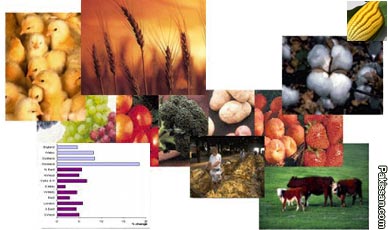|
Prices lowest in the region
By Ihtashamul Haque
ISLAMABAD:
 Prices
in Pakistan cannot be controlled due to the worldwide oil
price phenomenon but these prices, especially that of wheat
flour, sugar, milk etc were much lower in the country than
those of the neighbouring countries, including India, said
Prime Minister's Adviser on Finance Dr Salman Shah. Prices
in Pakistan cannot be controlled due to the worldwide oil
price phenomenon but these prices, especially that of wheat
flour, sugar, milk etc were much lower in the country than
those of the neighbouring countries, including India, said
Prime Minister's Adviser on Finance Dr Salman Shah.
"Yes to some extent the government could ensure price
stability but one has to take into account the increasing
oil price phenomenon in the international market, which is a
matter of concern for every nation," he added.
In an interview with Dawn, he said that inflation has always
been a very important issue for the government as it
concerned the common man and that his ministry remained in
touch with the central bank throughout the year to ensure
price stability across the country.
 Dr
Salman shared with Dawn an official summary that talked
about price comparison of Pakistan with India, Bangladesh,
Sri Lanka, United Arab Emirates (UAE), Saudi Arabia, Iran,
Afghanistan and China. Dr
Salman shared with Dawn an official summary that talked
about price comparison of Pakistan with India, Bangladesh,
Sri Lanka, United Arab Emirates (UAE), Saudi Arabia, Iran,
Afghanistan and China.
Talking about India, the adviser on finance said that except
for mutton and beef, the prices of all essential items,
including wheat flour, nasoor pulse, moong pulse, mash
washed, gram washed, farm chicken, eggs, red chillies
(powdered), garlic, diesel, petrol (super/Octane 90),
kerosene oil and cement were low in Islamabad than New
Delhi.
He said prices of most of the consumer items were still
below than those of many South Asian and gulf countries.
Here are some of the questions and answers of the interview
with Dr Shah.
Q. From an average Pakistani perspective do you agree that
prices of essentials (wheat flour, ghee, sugar, rice, milk),
utilities (electricity and gas), transport, medicines and
housing (value of land, construction and rent) are high and
increasing at a rate much higher than the capacity of the
people to increase their earnings.
A. I do not have to tell you that the oil prices in the
international market have changed the dynamics of every
thing. Therefore, I would not like to unnecessary defend the
government by saying that every thing was okay and that
increased prices did not hurt the common man in the country.
It was the time when there was no much importance given to
palm oil but ever since it was being used as bi-diesel, its
prices have gone up from $400 to $650. Earlier, palm oil was
mostly used as ghee but now the situation was different and
this has affected the international oil prices.
But I can tell you that core inflation was down at 5.5pc but
whenever there was oil price increase in the international
market, this core inflation created problems. There has been
some active hold on oil prices in the country due to which
inflation remained under control to some extent.
In April 2005, food inflation had gone down by 15 per cent
across the country, which has now further come down to 8 per
cent. There is going to be a bumper wheat crop this year and
it will certainly help reduce or bring stability in the food
prices.
But the overall inflation target of 6.5 per cent set for
2006-07 was unlikely to be achieved and it would be around 7
per cent. For next year, we are proposing 6 per cent
inflation target.
Q. In a free market environment interplay of demand and
supply determine prices. In stable economies these movements
are within a narrow band. In Pakistan prices have risen
drastically in sectors except for telecommunication where
the quality of service is improving and call rates have
actually come down. Why is that?
A. Our major emphasis and effort is to keep the prices in
check by continuously improving the supply side and it was
evident, particularly in the case of cement prices, which
had been brought down from Rs340 per bag to Rs240 per bag.
Likewise, the government decided to immediately import sugar
when its prices were not being reduced by the sugar mills.
And the timely import of sugar helped reduce and stabilise
sugar prices in the country. Now sugar is being sold at the
utility stories at the rate of Rs26-27 per kg.
The government also allowed the import of wheat, pulses,
meat and vegetables with view to ensure improved and smooth
demand and supply situation. One of the reasons to
experience increase in inflation was floods in Sindh due to
which many crops were destroyed and at times it became
difficult to ensure better supply side situation. However,
this supply side is improving.
About the prices of electricity, gas etc different
regulatory authorities were ensuring price stability to
avoid unfair price phenomenon.
Q. There is an impression that government covers up for
cartel makers. Many cabinet members are said to be
protecting people involved in capital and com-modity market
manipulations. Why the NAB investigations against market
manipulators were dropped.
A. Pakistan is a globalise economy and as such it cannot
operate in isolation. When the international oil prices
increased from $20 per barrel to $80 barrel, it created
problems for all the countries and Pakistan was not an
exception.
I have told you that when sugar prices were increased in the
domestic market, the government instantly allowed its import
and at times duty on it was also lowered or removed. The
objective was to benefit the consumers. Unless you are an
oil producing country, you cannot escape pain and hard time
that is given by oil price increases.
Under these circumstances, it becomes difficult to control
prices. In real estate market, speculators thrive due to
huge demand for property especially by overseas Pakistanis.
They want to buy property in Pakistan, particularly after
Sept 11, 2001 terrorist attacks in the United States.
It is not illegal to speculate and the solution lies in
increasing the demand for housing. Look at Islamabad where
the government has opened many new sectors with a view to
reduce or stabilise real estate prices. Then there is a
construction boom, which is helping to provide more and more
jobs to the people.
Q. What steps are you taking to bring houses within the
reach of an average Pakistani?
A. Unfortunately, people made their investment mostly in
real estate and stock market after 9/11, although there were
other sectors, which could provide ample business
opportunities.
.
Courtesy: The DAWN
|
Pakissan.com;
|